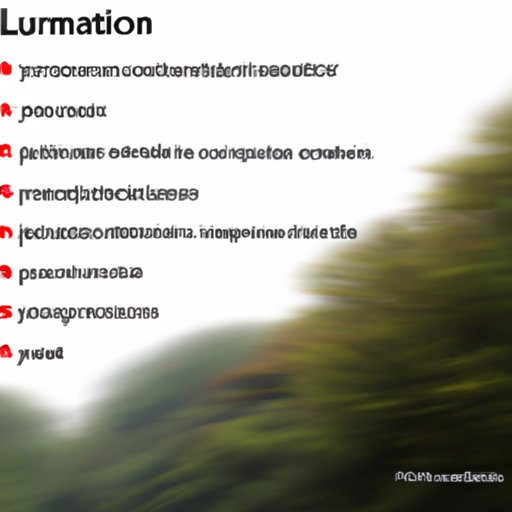Introduction
In science, a limiting factor is any environmental component or condition that restricts or regulates the growth or development of an organism or population. This concept is especially important for understanding population dynamics, species interactions, and evolution. In this article, we will explore what does limiting factor mean in science by examining examples of limiting factors in nature, investigating how limiting factors affect ecosystems, discussing human impact on limiting factors, and analyzing the role of limiting factors in evolution.

Examining Examples of Limiting Factors in Nature
Limiting factors can be either abiotic (non-living) or biotic (living). Abiotic limiting factors include physical components such as temperature, light, soil type, and water availability. For example, a species’ ability to survive in an area may be limited by temperature, as not all species can tolerate extreme hot or cold temperatures. Biotic limiting factors include competition between species for resources, predation, and disease.
Investigating How Limiting Factors Affect Ecosystems
Limiting factors can have a profound effect on the structure and function of ecosystems. By restricting the growth of certain species, they can influence species interactions and the overall diversity of a given area. For instance, if two species are competing for the same resource, one may outcompete the other and become the dominant species in the area. This could lead to the displacement of the less competitive species or even its extinction.
Limiting factors can also affect species diversity. If a certain limiting factor is present in an area, it may favor certain species over others, resulting in fewer species inhabiting the area. For example, if a particular habitat is too dry, it may favor drought-tolerant species over species that require more moisture. This could lead to a decrease in overall species diversity in the area.

Discussing Human Impact on Limiting Factors
Humans can also have an impact on limiting factors in nature. Pollution from industry and agriculture can alter the chemical composition of the environment and make it unsuitable for certain species. Overharvesting of resources can also reduce the availability of food or shelter for organisms, leading to decreased population sizes or even extinction.
In addition, humans can introduce new species into an area, which can act as a limiting factor for native species. For example, when non-native species are introduced into an area, they may compete with native species for resources, leading to a decrease in the abundance of native species.

Analyzing the Role of Limiting Factors in Evolution
Limiting factors play an important role in evolutionary processes. Natural selection favors those individuals that are better adapted to their environment. The presence of certain limiting factors can create selective pressures that drive the evolution of new traits and adaptations. This process is known as adaptive radiation, where a single species evolves into multiple species that are adapted to different environments.
For example, a study conducted by researchers at the University of Edinburgh found that the presence of different types of predators can drive the evolution of defensive traits in prey species. The study found that species living in areas with more diverse predator communities had evolved more complex defensive strategies than those living in areas with fewer predators.
Conclusion
In conclusion, limiting factors play an important role in our understanding of population dynamics, species interactions, and evolution. Limiting factors can be either abiotic or biotic and can have a profound effect on the structure and function of ecosystems. Humans can also have an impact on limiting factors in nature, through pollution, overharvesting, and the introduction of new species. Finally, limiting factors play an important role in evolutionary processes, driving the emergence of new traits and adaptations.
(Note: Is this article not meeting your expectations? Do you have knowledge or insights to share? Unlock new opportunities and expand your reach by joining our authors team. Click Registration to join us and share your expertise with our readers.)
